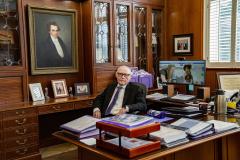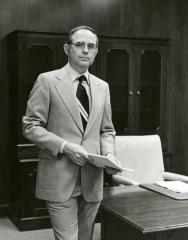
Dr. William R. Johnson, Stephen F. Austin State University’s fourth president, seated in the president’s office during a campus visit for SFA’s centennial celebrations held in 2023.
Johnson was born Jan. 12, 1933, in Houston, Texas. Under his leadership at SFA, the university experienced significant growth, despite facing budgetary challenges. Johnson expanded academic offerings and degree programs, helping the institution continue its mission of excellence in education.
During his tenure, Johnson was responsible for several transformative projects across the campus. He oversaw the construction of Dugas Liberal Arts North and the Bush Mathematical Sciences Building. Additionally, he spearheaded the renovation of what was then called the University Center, the Forestry Building, the Rusk Building and the Lehmann Chemistry Building, among several other construction and renovation projects. Built in 1974, the William R. Johnson Coliseum was also named in his honor.
Additionally, Johnson oversaw the creation of the Regents Professors program, the University Scholars program, and the first fully funded academic chairs at the university.
His leadership extended beyond SFA as he served on the statewide committee that led to the creation of the Higher Education Assistance Fund, which continues to support Texas universities in building and updating campus facilities.
“Dr. Johnson’s legacy at SFA is remarkable,” said Dr. Neal Weaver, SFA president. “His ability to lead during challenging financial times while making long-lasting contributions to our campus is a testament to his vision and resilience. His impact is felt in every corner of our university, and he will be deeply missed.”

Dr. William R. Johnson served as Stephen F. Austin State University’s fourth president from 1976 through 1990, making him one of the university’s longest-serving presidents.
As Johnson himself said in a 1983 commencement address, reflecting on the transformative impact of SFA: “When the quiet moments come, when you are able to escape the cacophony of the day, you will remember this place … the residence halls, the classrooms and the laboratories, the UC, the trees, the flowers in the spring — and probably the cafeteria. You will remember the people and friendships … You will remember the successes and the failures. Especially, I hope that you will remember the excitement of learning.”
Prior to his presidency at SFA, Johnson served as vice president of academic affairs at Texas Tech University. Even after his retirement, Johnson remained a valued and active member of the SFA community, continually supporting the university through mentorship and advocacy.
For SFA’s centennial year in 2023, Johnson graciously agreed to share memories of his time at the university. To watch his SFA Centennial Conversation interview, visit gosfa.com/centennialconvos-johnson.
The SFA family extends its heartfelt condolences to Johnson’s family, friends and all those who knew him. A private graveside service with military honors will be held for family and close friends at 11 a.m. Monday, Oct. 28, at South Park Cemetery in Pearland, Texas. A memorial service is scheduled for 2 p.m. Saturday, Nov. 9, at First United Methodist Church in Nacogdoches with Dr. Jeff McDonald officiating and a reception to follow.
ABOUT STEPHEN F. AUSTIN STATE UNIVERSITY
Stephen F. Austin State University, the newest member of The University of Texas System, began a century ago as a teachers’ college in Texas’ oldest town, Nacogdoches. Today, it has grown into a regional institution comprising six colleges — business, education, fine arts, forestry and agriculture, liberal and applied arts, and sciences and mathematics. Accredited by the Southern Association of Colleges and Schools, SFA enrolls approximately 11,000 students while providing the academic breadth of a state university with the personalized attention of a private school. The main campus encompasses 421 acres that include 40 academic facilities, nine residence halls, and 68 acres of recreational trails that wind through its six gardens. The university offers more than 80 bachelor’s degrees, more than 40 master’s degrees and four doctoral degrees covering more than 120 areas of study. Learn more at sfasu.edu.
By Christine Broussard, assistant director for strategic communications at Stephen F. Austin State University.
With research assistance from Chris Cotton, university archivist and research coordinator with SFA’s East Texas Research Center.



